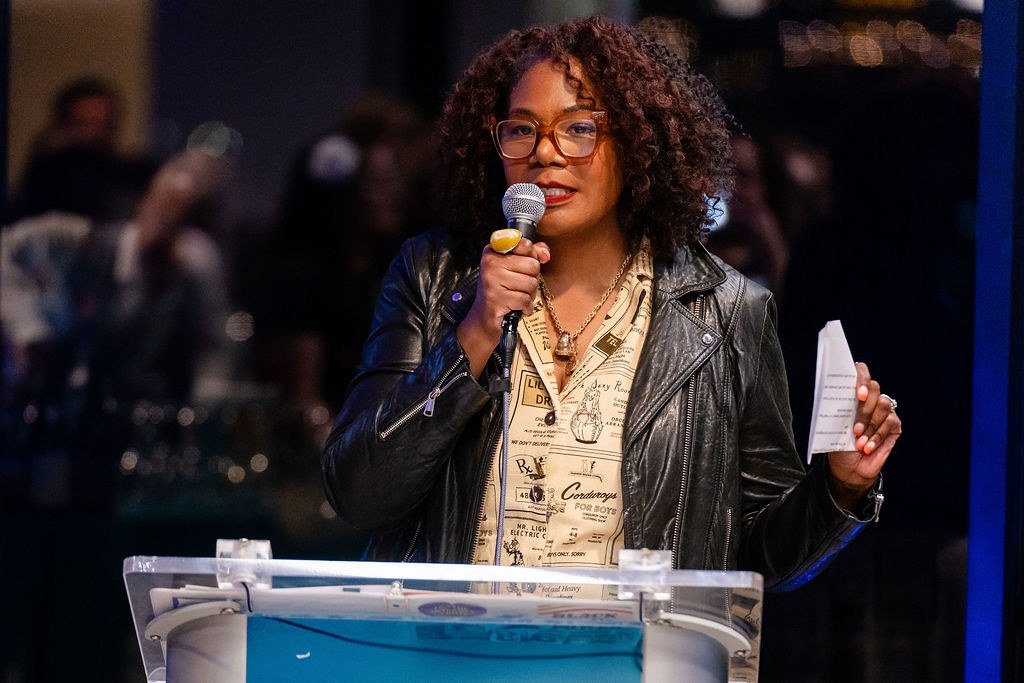Remembering Brandi Collins-Dexter

During her brilliant career, Brandi Collins-Dexter touched and improved so many lives.
Nick Moreland Photography
On June 25, 2025, Brandi Collins-Dexter passed away at her home following a battle with pancreatic cancer. She was 44.
Brandi was a researcher, policy advocate, activist and author of Black Skinhead: Reflections on Blackness and Our Political Future. She was also a Free Press board member and consultant, a longtime colleague and comrade, a giant of the media-justice field and a beloved friend.
Brandi was a force of nature. She was brilliant and discerning. Her time on this earth was too short, yet she touched and improved so many lives, including ours. She spent her entire career serving others, working to improve the material conditions of humankind and redress anti-Black racism in our society.
A rich legacy of activism and scholarship
Brandi was deep, strategic and effective, earning her many well-deserved accolades and recognitions, including being named “one of the most influential African Americans” in the country by The Root. She was formerly a visiting fellow at the Harvard Kennedy School’s Shorenstein Center on Media, Politics and Public Policy, and a senior campaign director at Color Of Change, where she led various successful campaigns for corporate and government accountability. In October, the United Church of Christ Media Justice Ministry will posthumously honor her with the Everett C. Parker Award.
During her years at Color Of Change — and as a staff member at the Center for Media Justice (now MediaJustice) before that — Brandi played a critical leadership role in the Voices for Internet Freedom Coalition, where she was a key voice in the fight for Net Neutrality and affordable internet access. While at Color Of Change, she worked with Free Press and other allies to launch Change the Terms, a coalition that pressured social-media companies to stop amplifying hate and racism. She successfully pushed Facebook to undergo a civil-rights audit, pressured financial companies to stop funding hate groups, and played a leading role in getting the hate-mongering O’Reilly Factor taken off the air. She also succeeded in getting R. Kelly’s record label to drop him in response to the singer’s sexual abuse of young girls.
Brandi was a key collaborator and adviser to Free Press’ Media 2070 project, which advocates for media reparations. She connected and shaped numerous coalitions and campaigns across so many issues: racial and criminal justice, corporate power and antitrust, surveillance and privacy.
Brandi was a sought-after expert on communications, corporate accountability and Black politics who advised foundations, testified regularly before Congress and was often cited in the media. As accomplished as she was for such a young person, what we will remember most about Brandi is her uncompromising humor and her willingness to dig into the hard issues with honesty, clarity and rigor.
Her passing is a huge loss in the struggle for media and racial justice. She was truly one of the greats, and we are devastated that she is gone.
Those of us at Free Press who were so moved by her ideas, her insights and her deep commitment to the work will do our best to carry forward her work and live up to her legacy.
In her book, Brandi — mourning the loss of her father — wrote:
“I imagine everyone my family lost in a hole-in-the-wall bar in heaven, drinking shots of cognac and listening to Roy Hamilton … or Bobby Womack. Maybe they’re there, too. And everyone is feeling free. And everyone is safe.”
Through our tears, we will think of Brandi sitting in that same bar, with her dad and her favorite records, free and safe.
Rest in power, Brandi Collins-Dexter. We’ll miss you dearly.